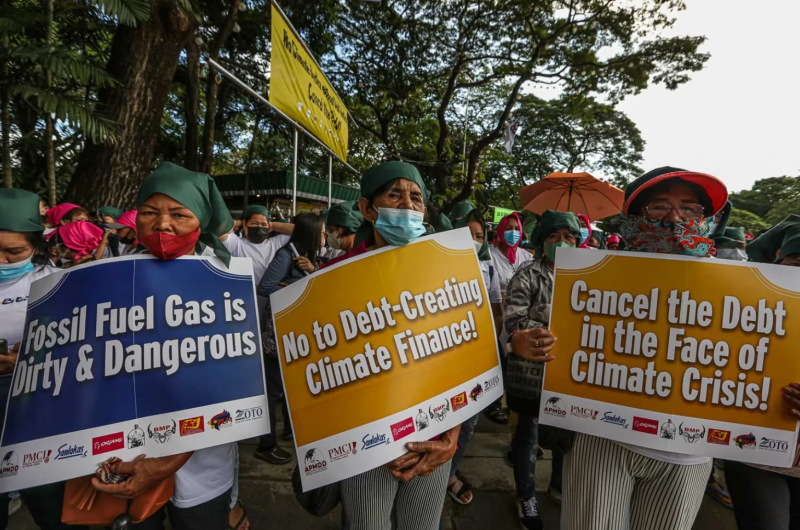
The UK government has been accused of “double counting” £500 million of foreign aid by reclassifying humanitarian and developmental aid meant for poor and conflict-ridden countries as ‘climate finance.’
In information that was uncovered through a Freedom of Information Request, Carbon Brief reported that most of the aid being counted as climate finance has no relationship whatsoever to climate finance, and is intended for humanitarian purposes like alleviating hunger. Climate finance is supposed to be specifically targeted at improving countries’ ability to adapt to the adverse impacts of climate change and reducing carbon emissions through renewable energy projects, low-pollution transport and biodiversity protection.
Observers contend that by ‘double counting’ and conflating run of the mill bilateral aid with climate finance, the UK will be able to reach its climate finance goals without spending what they would have needed to. This means that the UK will not be “providing any new funds for climate action, as it was already planning on distributing this money.”
Carbon Brief has highlighted that under the UK’s new accounting practices, 30% of humanitarian aid for countries described as climate vulnerable will be reclassified as climate finance, regardless of whether the funding is intended to address climate vulnerabilities. Furthermore, all of this will be funding that has already been committed, and is not new spending on climate related projects. According to the Independent Commission for Aid Impact (ICAI), the UK has “reclassified £1.72 billion of spending as climate finance between 2021-22 and 2025-26,” primarily by assuming that its multilateral development bank funding counts as climate finance.
This practice is being seen as a moving of the goalposts on climate finance, which means that rich countries will make little substantive progress towards the climate finance pledge of providing $100 billion in climate finance to developing countries annually.
What is climate finance?
Climate finance is cash in the form of loans, grants and aid that is intended for poor countries to assist them in reducing greenhouse gas emissions and cope with the impacts of adverse weather events. It is widely recognized that developing countries tend to be more susceptible to the impacts of climate breakdown. Rich countries pledged at the 2009 Copenhagen climate summit to help poor countries cope with the climate crisis by providing them at least $100 billion in climate finance annually. The promise has only come close to being fulfilled towards the end of 2023.
UN Secretary General Antonio Guterres suggesting that funding falling short of the longstanding pledge will likely have a damaging impact on the legitimacy of the Paris Agreement for developing countries.
At the UN General Assembly in 2019, former British Prime Minister Boris Johnson announced that the UK was going to double its spending on international climate finance (ICF) in a bid to “help developing countries turn the tide against climate change and species loss.”
The British government subsequently committed to giving out £11.6 billion in climate finance in the five years from 2021 to 2026, a target that was doubled from the original £5.8 billion. This climate funding was slated to be part of the $100 billion in climate finance that rich countries committed to raise for developing countries under the Paris Agreement. This move garnered wide praise, establishing the UK as a leader in climate finance.
In July 2023, the Guardian reported that the British government sought to abandon their commitment to providing climate finance, citing “government cuts to aid funding, underspending and new commitments, such as aid for Ukraine” as the reasons why. Another report from 2023 suggested that the UK was “missing climate targets on nearly every front.”
The UK is not alone in falling behind on its climate finance pledges, according to a report from Care International aptly titled Hollow Commitments. The report suggests that “It is clear that developing countries and those that are particularly vulnerable to adverse impacts of climate change will not obtain the support to which they are entitled,” and that there is no assurance that the annual $100 billion goal will ever consistently be met.
The report also observes that “numerous studies have shown that wealthy countries significantly over-report the climate finance they provide,” with an audit by Oxfam suggesting that the actual value of climate finance provided may only amount to approximately one third of what wealthy countries themselves report.
Oxfam has also criticized lenders for giving out loans on high-interest rates in the name of climate finance. In its Climate Finance Shadow Report, Oxfam has decried the practice of structuring climate finance as loans and not grants. Loans make up nearly 80% of all climate finance provided to developing nations from 2020-2022.
